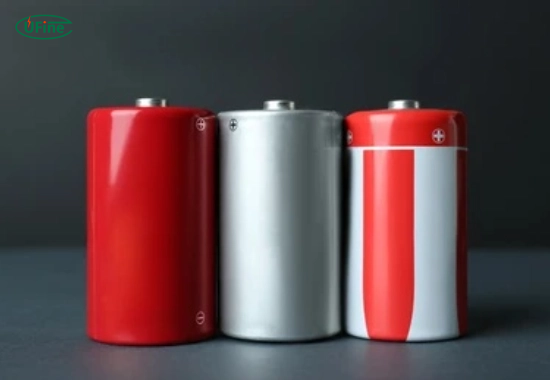
- Part 1. What is a C-size rechargeable battery?
- Part 2. Are all C-size rechargeable batteries the same?
- Part 3. What are the main types of C rechargeable batteries?
- Part 4. Battery capacity and voltage differences
- Part 5. Recharge cycles: How long do they last?
- Part 6. Which brands offer the best C rechargeable batteries?
- Part 7. Common myths about C rechargeable batteries
- Part 8. How to test C rechargeable battery performance?
- Part 9. Safety tips and common mistakes
- Part 10. Rechargeable vs disposable: Which is cheaper?
- Part 11. Environmental impact of rechargeable C batteries
- Part 12. Best C rechargeable batteries in 2026 (with specs)
- Part 13. Can you use AA in place of C batteries?
- Part 14. FAQs about C rechargeable batteries
Looking for the best rechargeable C batteries? Not all C cell batteries perform the same. This guide compares types, chemistry, voltage, capacity, and lifespan to help you pick the right rechargeable C cell battery for flashlights, toys, radios, and emergency kits.
When shopping for rechargeable C batteries, it’s easy to assume they’re all the same—the same size and shape—so they must work the same way, right?
Not quite. While C-size rechargeable batteries may look identical on the outside, a lot is happening under the surface, making each battery very different in terms of performance, chemistry, lifespan, voltage, and usage.
In this detailed guide, we’ll explain everything so you can confidently choose the right C rechargeable battery for your needs—whether for a flashlight, toy, radio, or emergency equipment.
Part 1. What is a C-size rechargeable battery?
A C-size rechargeable battery is a medium cylindrical battery commonly used in devices requiring more power than AA or AAA batteries. Rechargeable C batteries, like NiMH and Li-ion types, can be recharged hundreds of times, offering eco-friendly and cost-effective performance.
Part 2. Are all C-size rechargeable batteries the same?
No, they’re not. Even though C rechargeable batteries share the same physical size, they can be wildly different inside. Here’s what sets them apart:
- Battery chemistry (NiMH, NiCd, Li-ion)
- Voltage output
- Capacity (measured in mAh)
- Number of charge cycles
- Discharge rates
- Brand reliability
So, while they might fit into the same device, not all C batteries will perform the same way—or even work at all, depending on your device.
Part 3. What are the main types of C rechargeable batteries?
Not all rechargeable C cell batteries are the same. Here are the main types:
| Type | Nominal Voltage | Capacity (mAh) | Recharge Cycles | Pros / Cons |
|---|---|---|---|---|
| NiMH | 1.2V | 2000–5000 | 500–1000 | Safe, eco-friendly, minimal memory effect, works for most household devices |
| NiCd | 1.2V | 1000–2500 | 300–800 | Performs well in cold, suffers memory effect, contains toxic cadmium |
| Li-ion | 3.6V–3.7V | 1500–4000 | 300–500 | High energy density, lightweight, not compatible with 1.5V devices |
Part 4. Battery capacity and voltage differences
Battery capacity (mAh) indicates how long a C battery lasts. High-capacity batteries are ideal for toys, radios, and emergency kits, but check reviews to avoid inflated claims.
Most rechargeable C batteries output 1.2V, while disposable alkaline C batteries provide 1.5V. Using the wrong voltage can cause devices to malfunction.
Artikel Terkait: AA vs C vs D battery: A Comprehensive Comparison
Part 5. Recharge cycles: How long do they last?
Cycle life indicates how many times a battery can be recharged. Using a smart charger can extend battery lifespan.
| Battery Type | Average Recharge Cycles |
|---|---|
| NiMH | 500–1000 |
| NiCd | 300–800 |
| Li-ion | 300–500 |
Pro Tip: Use a smart charger to avoid overcharging and extend battery life.
Part 6. Which brands offer the best C rechargeable batteries?
Not all brands are created equal. Some are built to last, and others are not so much.
🔝 Top-rated brands:
- Energizer Recharge Universal C
- Duracell Rechargeable C
- EBL High Capacity C
- Tenergy Premium C
- Powerex Imedion C
These brands offer reliable performance, accurate capacity ratings, and longer lifespans. Avoid generic or ultra-cheap batteries with no reviews or certifications.
Part 7. Common myths about C rechargeable batteries
Let’s clear up a few misconceptions:
- Myth 1: All C batteries are interchangeable → ❌ False! Voltage and chemistry matter.
- Myth 2: Higher mAh always means better battery → ❌ Not always. Quality and discharge rate matter too.
- Myth 3: You can use any charger → ❌ Dangerous! Always use a charger made for C rechargeable batteries.
Part 8. How to test C rechargeable battery performance?
Want to know if your battery is still good? Here are three easy methods:
- Use a battery tester with a C-cell slot
- Measure voltage with a multimeter (should be close to 1.2V when charged)
- Test run time in a known device (e.g., flashlight or toy)
If your battery dies or drops voltage fast, it’s time to replace it.
Part 9. Safety tips and common mistakes
- Store in a cool, dry place
- Use a smart charger designed for C batteries
- Charge before long-term storage
- Avoid mixing old and new batteries
- Never use damaged or leaking batteries
- Remove batteries from devices if unused for months
Part 10. Rechargeable vs disposable: Which is cheaper?
Example cost comparison over 500 uses:
- 4-pack NiMH C batteries ($20) → $0.04 per use
- 4-pack disposable C batteries ($6 per pack) → $750 total for 500 uses
Rechargeable C batteries are far more economical long-term.
Part 11. Environmental impact of rechargeable C batteries
Using rechargeable batteries helps reduce:
- Landfill waste
- Heavy metal pollution
- Carbon emissions from battery production
Also, many brands now offer recyclable packaging and take-back recycling programs.
Remember to recycle old batteries properly—never throw them in the trash.
Part 12. Best C rechargeable batteries in 2026 (with specs)
Top recommended C rechargeable batteries based on capacity, reliability, and reviews:
| Brand | Capacity (mAh) | Chemistry | Recharge Cycles | Price (2-pack USD) |
|---|---|---|---|---|
| Energizer Recharge Universal C | 2500 | NiMH | 1000 | $18 |
| EBL High Capacity C | 5000 | NiMH | 1200 | $22 |
| Tenergy Premium C | 4000 | NiMH | 1000 | $19 |
| Powerex Imedion C | 5000 | NiMH | 1000 | $24 |
| Duracell Rechargeable C | 3000 | NiMH | 400 | $16 |
Part 13. Can you use AA in place of C batteries?
Some people try using AA batteries with C-size adapters, especially in a pinch. This can work, but…
- AA batteries have a much lower capacity
- Devices may not run as long
- Not ideal for high-drain equipment
Only use this as a temporary solution.
Part 14. FAQs about C rechargeable batteries
Are all C rechargeable batteries 1.2 volts?
Most NiMH and NiCd C batteries are 1.2V. Li-ion C batteries can be 3.6V–3.7V, which may not be safe for all devices.
Which C battery is best for household devices?
NiMH C batteries are safe, eco-friendly, and compatible with most household devices like toys, flashlights, and radios.
How many years do rechargeable C batteries last?
With proper care, NiMH C batteries can last 3–5 years. Cheaper or poorly stored batteries may last 1–2 years.
Can I mix different brands of C batteries?
Mixing brands or chemistries is not recommended. It may reduce battery lifespan or damage your device.
Related Tags:
More Articles

What are Watts and Watt Hours in Battery?
Understand watt vs watt-hour in batteries, how to calculate battery watt hours, and what Wh means for car batteries, devices, and energy storage.
A Complete Guide to the Best Batteries for Flashlights
Compare the best batteries for flashlights, including AA, AAA, 18650, 21700, CR123A. See which battery offers the best brightness, runtime, and reliability.
How Long Do Rechargeable AA Batteries Last?
How long do rechargeable AA batteries last? Compare NiMH and lithium AA lifespan, recharge cycles, key factors, and performance vs alkaline batteries.
How Much Current Can a 9V Battery Really Supply?
Discover how many amps a 9V battery can supply, its actual current output, discharge rate, and capacity for alkaline, lithium, and rechargeable 9V batteries.
12V STD vs 12V AGM: Meaning, Differences, and Which Is Better
Understand what STD and AGM batteries mean, their key differences, and which 12V battery fits your needs best in 2026.



